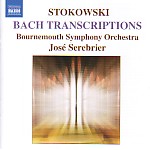Stokowski’s Bach transcriptions have received a great deal of attention on disc lately, but this is one of the very few recordings that has the genuine flavor that Stoki himself brought to them. The obvious first question is: How do these versions compare to the “originals”? Can they be as good? The answer, quite simply, is “Yes, they can.” Serebrier doesn’t try to duplicate every gesture that Stokowski made. That would be impossible in any case, given the wide range of tempos and other variations among his own numerous recordings of these pieces. Take the Passacaglia and Fugue in C minor: Stoki’s own timings varied between about 12 minutes (in Philadelphia) to more than 14 in a later rendition. Serebrier takes about 13, which is similar to the tempo Stokowski adopted in his 1940s All-American Youth Orchestra reading (on Cala).
In general Serebrier is a bit swifter than his late mentor, particularly in such numbers as Komm süsser Tod and Nun komm’ der Heiden Heiland, but speed isn’t really the issue with Stokowski. What matters more is sonority, that special “Stokowski sound”. The fact is, these orchestrations are not particularly original or imaginative. They are almost uniformly (indeed formulaically) based on strings as the principal voices, with woodwind and brass reinforcement as necessary. Heard in quantity, they risk sounding quite monochrome. Some, like the “Little” Fugue in G minor, use the winds in imitation of the organ, but there’s nothing special in that. What makes them work is not how they are written, but rather how they are played. Take the famous Air from the Orchestral Suite No. 3. Listen to Serebrier summon that rich vibrato from the cellos, the shimmering texture of the seraphic violins, and the discreet touches of portamento: this is the true “Stokowski sound”–sensual, luminous, and warm.
Or take the almost apocalyptic entry of the full orchestra toward the end of the “Little” Fugue: Serebrier understands that theatrical flair, even bordering on vulgarity, makes these arrangements come to life. There’s a sense of danger here–of almost, but never quite, crossing over the “bad taste” line–that makes listening so much more fun. The same sense of nearly garish drama characterizes this powerful performance of the Passacaglia and Fugue. It’s worth pointing out, by the way, that it probably was a smart move to omit the Toccata and Fugue in D minor, for two reasons. First, it eliminates the temptation to make obvious and facile comparisons to Stokowski’s half-dozen recordings of the most famous of all his Bach transcriptions; and second, it leaves hope that another disc may be forthcoming containing an equally rewarding mixture of the familiar and unfamiliar.
Aside from Bach, Serebrier includes Stokowski’s own Two Ancient Liturgical Melodies, a sexy conflation of Veni Creator Spiritus and Veni Emmanuel, as well as the Handel and Purcell items. Dido’s Lament sounds particularly dark and tragic in this performance. It’s clear that the Bournemouth Symphony is having a great time reproducing these ultra-rich, Golden Age sonorities, and my only quibble concerns the principal oboe, whose clicking valves decorate his solos with excessive prominence. But then Stokowski himself made magic with every kind of orchestra and caliber of player, so this isn’t a big issue. The engineering supports the interpretations particularly well, giving the strings the necessary sheen and allowing the climaxes to expand hugely. Like Serebrier’s and Bournemouth’s previous Stokowski project, dedicated to Mussorgsky, this new release is an unqualified triumph. [6/5/2006]
































